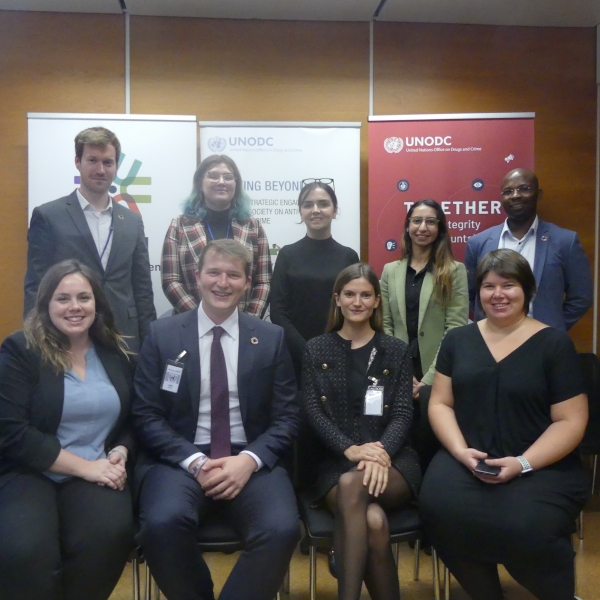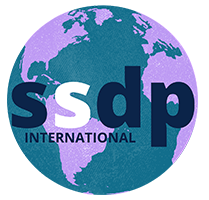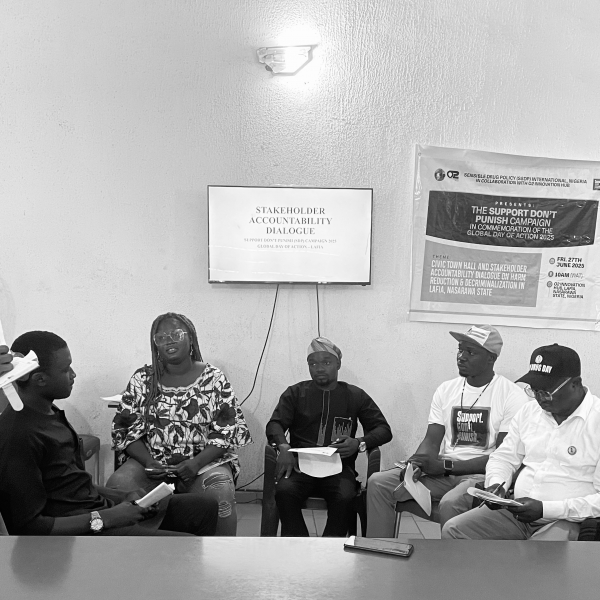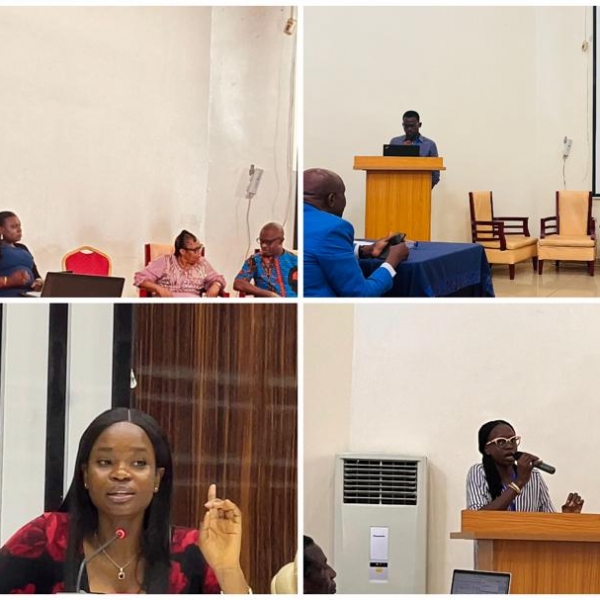The UNODC Youth Consultation

Upon entering the Vienna International Centre, I was very excited. For the first time, I walked into a UN forum where the youth voice would be the centre of attention. Up until now every time I walked into UN events I was there to observe events and try to catch the attention of decision-makers through meetings on the sidelines, side events or statements in the main sessions. But this day would be different, we would have the opportunity to talk about how young people and youth-related organisations could be more involved in UNODC processes. SSDP International sent a letter, co-signed by over 60 NGOS, to Ghada Waly, Executive Director of UNODC, on this very topic during the 65th Session of the Commission on Narcotic Drugs (CND) this past March.
The Youth Consultation was organised by the UNODC Civil Society Unit, with the first half of the day focusing on Youth Involvement in the UNODC and the second half focusing on Youth Involvement in United Nations Convention Against Transnational Organized Crime (UNTOC). Billy Batware, programme officer at UNODC, facilitated the meeting. Billy is passionate about youth involvement in UNODC’s work and equally as passionate about civil society involvement.
Billy opened the meeting, thanking us for participating and explaining the structure of the day, and swiftly handed over to Angela Me, Chief of the UNODC Research and Trend Analysis Branch. Angela noted how all UN events begin with “an old person making boring remarks”, which elicited a few chuckles from the room. After outlining the youth initiatives UNODC is working on, she went on to urge us to “help [UNODC] to understand the things we don’t see” and stressed that we must ask the hard questions and “be provocative”, a sentiment that the participants certainly embodied throughout the session.
Following Angela’s statement, Kirsty Rancier, Youth Focal Point at UNODC framed up the conversation. She outlined further UNODC’s various efforts to engage young people, highlighting a scattered approach to youth involvement, where many programs and offices had involved young people when the opportunity presented itself. She explained her role is to connect the youth focal points across UNODC, and that this session was part of that effort. The Youth Empowerment Accelerator Framework and efforts by the Strategic Planning and Inter-Agency Affairs Unit (SPIA) to mainstream youth involvement in UNTOC’s work took centre stage in Kirsty’s speech.
The session formally began with a handful of speakers including Su Hyun Hong from the UNODC Youth Initiative on Drug Prevention, Leonardo Paradiso from the Grace Initiative, and Georgia Dimitropoulou from Youth Crime Prevention through Sport. Though a strong overview of what UNODC is currently doing regarding youth and introduced me to some projects I was unaware of, the presentations gave the shiny marketing version of the work and brought the downfalls of these programs to the front of everyone’s minds.
We broke up into discussion groups and began with the first few questions. My group focused on two questions: How can youth be better engaged in policy-making such that their voices are reflected in intergovernmental discussions? How can you be better engaged in UNODC programming? The conversation quickly turned to the tokenism of youth and the barriers to youth engagement. A palpable quote came from the Austrian youth representative, that UNODC needs to ensure “youth [are] not just being used as resources but as partners”. This struck a chord with participants, as it is so often youth are asked to ‘participate’ in various projects but are rarely involved in the design or decision-making mechanisms. Oftentimes this participation is incredibly limited and done with no compensation or formal recognition for their contributions, and at its worse ‘participation’ is simply being in the room with no opportunity for engagement. Multiple participants highlighted the need for co-creation and co-ownership of work within UNODC.
I took the opportunity to highlight key issues relating to the Youth Forum on Drugs. The Youth Forum consists of youth representatives nominated by member states, where they are taught about the Drug Prevention Standards and then break into groups to have discussions, notes from these discussions are then taken by UNODC to develop into a statement and the participants elect someone to make the statement during the Commission on Narcotic Drugs main session. There are many limitations to this model, firstly the participants are not invited to observe the CND and are therefore limited in their ability to consult their country delegations, similarly, the participants do not draft or approve their statement (some previous youth forum representatives have noted how the statement provided did not reflect their discussions), and finally, the participants lack opportunities to engage with youth civil society. Overall, it continues to be unclear if the Forum intends to function as a platform for youth engagement in policymaking or if it is simply a platform for promoting the Drug Prevention Standards, and continues to appear emblematic of tokenism and old-school diplomacy. The facilitators were receptive to these criticisms and other participants in our group voiced similar concerns. UNODC is limited in its ability to influence the Youth Forum as it is mandated by the CND and involves heavy member-state involvement. Billy did note that UNODC can use the learnings from these limitations to improve youth participation in other areas.
Barriers to participation dominated the conversation. Youth involvement is not enough, we need to involve the right youth, the young people who have lived experience and expertise in the policies in question. This conversation was incredibly nuanced and discussed a wide range of barriers, particularly as the focus of the day was on Transnational Organised Crime, ensuring access to those affected by trafficking was at the forefront of discussions. The issues of language and understanding the complexity of UN processes were stressed. Alongside this, the need for financial support and accessible scheduling of meetings was highlighted. Overall, participants highlighted how complex the barriers young people face are, and the only way to address this is by asking young people in question what they need to be able to participate.
Communication was also a huge aspect of the discussion, many participants felt UNODC’s communications were too formal, and thus, relatively inaccessible, particularly to young people. Suggestions ranged from training series to TikTok, to celebrity ambassadors (fun fact: Nicholas Cage was a UNODC Ambassador). Unfortunately, this conversation lacked some direction, which was a fairly defined characteristic of the consultation. It was unclear if the focus was on policy making or program design/implementation, and what UNODC is capable of in each of those areas. It’s unsurprising, as this is the first consultation of its kind at UNODC, so everyone was very eager to get their piece in, and this is a learning process for the facilitators. I’m happy to mark this up as growing pain. We were assured that there will likely be more youth consultations in the future. We, at SSDP International, will be pushing for a youth consultation on drugs!
It was a gratifying experience to be able to share our difficulties and recommendations with UNODC, but as always the proof is in the pudding, and we eagerly await the outcome report and hope to see big changes in youth engagement with UNODC in the near future.



